Scalping is Out of Control. Ticketmaster Thinks Blockchain Can Stop It.
Electronics. Sneakers. Luxury Goods. Concert Tickets.
No commodity is safe in the world of e-commerce, where scalping bots make Twitter's problems look tame by comparison. And it only seems to be getting worse, despite every effort to rein it in.
Just look at The Cure.

Hoping to prevent the bot-induced chaos of the recent Taylor Swift concert sale, the genre-defying 1980s hit machine teamed up with Ticketmaster through its "Verified Fans" program to limit sales for its latest tour. Only active accounts that meet certain profile conditions indicating they are likely to keep the tickets for themselves are allowed to buy them. They also announced tickets are non-transferable – a direct shot at resellers looking to cash in.
Nice try. Dedicated scalpers simply adjusted their tactics, transferring entire accounts along with the tickets to get around the new rules. (And, true to form, Ticketmaster pitched in with some shady practices of its own, tacking on fees in excess of the face value of the tickets, drawing a heated reaction from front man Robert Smith.)
It's whack-a-mole out there and the whacks are losing. Tickets are a $1 trillion business globally, and by some estimates as much as 20-30 percent of that is re-sale. It's not just a colossal pricing-error problem. Many bands, like The Cure, don't want to soak their fans, and intentionally sell tickets below what the market will pay. This creates a massive incentive to buy at face value, sell at the "real" price, and pocket the difference.
Marketplaces like Ticketmaster seem powerless to stop the practice, which sticks fans with high prices and takes money from artists and event organizers and hands it to middlemen. Most of it is completely legal but there are exceptions. Ticket sellers lobbied for and got a law on the books in 2016 making it illegal to circumvent online ticket sale security measures. It's even called BOTS (Better Online Ticket Sales – true story, I once knew a guy whose job was to come up with cool acronyms for stuff like this, he'd like this one).
Between that and Taylor Swift getting a hearing faster than the Jan. 6 insurrection, somebody on Capitol Hill knows what's up. But none of it has done any good. (Yes, you can argue ticket scalping is actually good, but we're moving on.)
Ticketmaster has not been asleep at the turntable. They've pioneered a number of new tactics, like True Fans, but these have not proven successful in the most coveted sales, like Swift's. Others, like dynamic pricing, up the cost for scalpers, but also hit regular fans with confusing higher prices, too.
What about blockchain? We thought you'd never ask.
Ticketmaster has experimented with NFTs in the past, issuing more than 5 million as commemorative tokens for events such as the Super Bowl. Now it has rolled out its first token-gated ticketing integration with death metal band Avenged Sevenfold.

The group has suffered some middling reviews over the years but they're still around and about to tour their 8th album this summer, with at least two appearances scheduled with Pussy Riot, including a headliner at Madison Square Garden. Apparently they're having a bit of Renaissance moment.
"Upon first listening to 'Nobody' it’s immediately apparent the extent to which Avenged Sevenfold have challenged themselves to craft something new and leagues apart from any of their previous works," writes Forbes' Quentin Singer in a recent panting review.
Should we actually know about these guys?
Yes, but we're not here to sell you on metal. We think their NFT announcement is a big deal, and we expect to see a lot of similar experiments roll out quickly. And it has implications beyond ticket sales.
To catch up: It turns out Avenged Sevenfold is pretty hip to crypto for old metal heads. They launched a collection of 10,000 NFTs in 2021 called the Death Bats Club, which is a collection of JPEG images with unique visual traits that are paired with real world benefits such as meet the band, and, most recently, early-access ticketing. It sold out.
"We have integrated Death Bats Club into Ticketmaster assuring that fans get the best tickets at the best prices without bots, scalpers and long wait-times," singer Matt Sanders confirmed on Twitter this week.
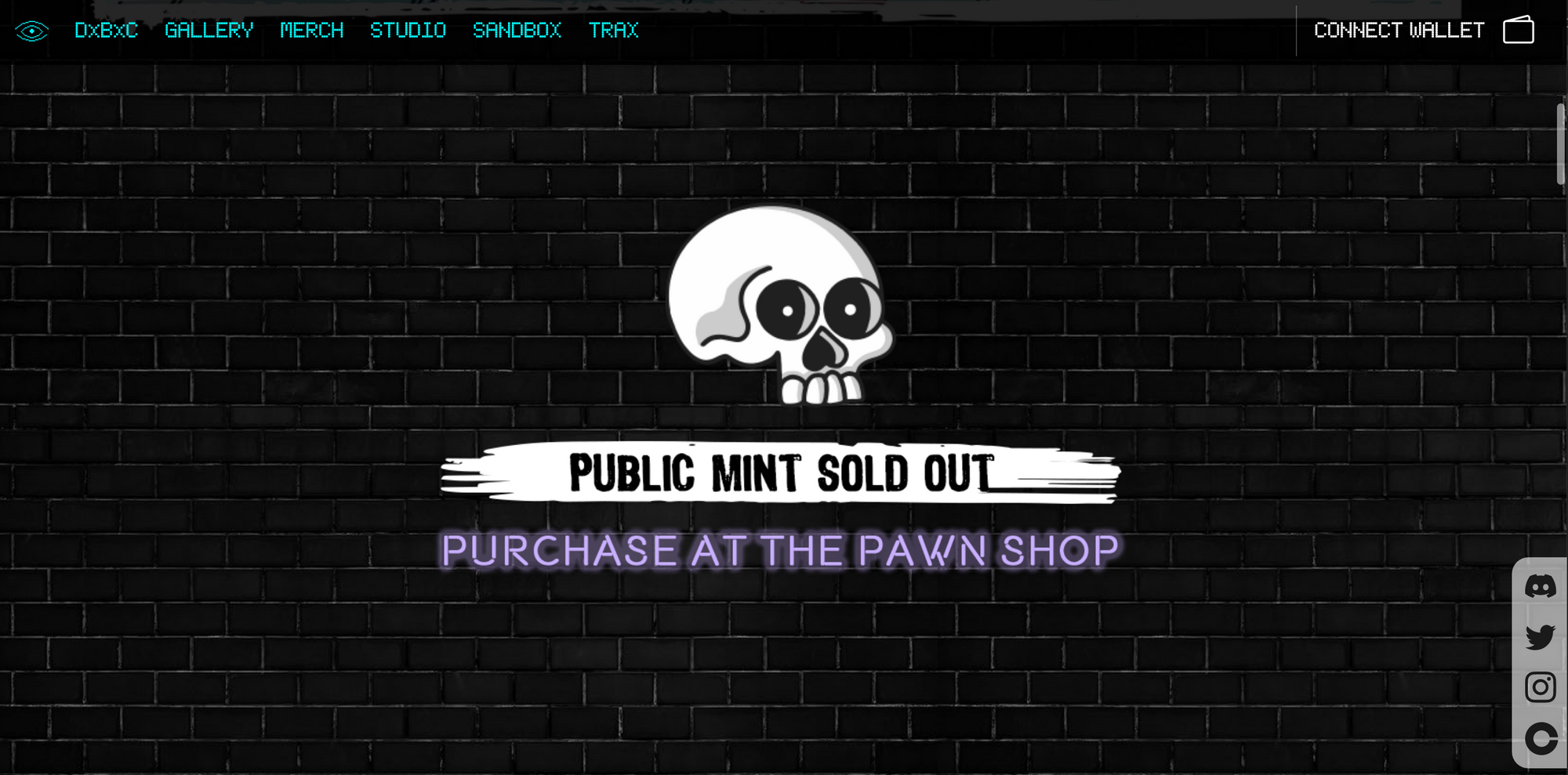
In the midst of NFT and crypto winter, it's a useful reminder of the real world utility of non-fungible tokens, which in the long run may turn out to be more interesting than a simple (speculative) cryptographic receipt of authenticity, which is how they are most commonly used in the world of digital art.
It's a subject we discussed recently with Mattereum CEO Vinay Gupta, who argues NFTs can create massive efficiencies in supply chains and global trade, for example, reducing waste (literally, reducing garbage). That's a far call from Open Sea.
While there is still a lot to prove in whether Avenged Sevenfold's early access program points to the future, especially in getting more artists and fans on board, it feels inevitable. There are many more features that could be added to such NFTs, which could not only solve old problems but create new opportunities as well.
The key is the "smart contract," or self-executing code written into the NFT. This allows for a complete do-over of the secondary ticketing market to the benefit of artists, fans and event organizers, and the non-benefit of scalpers. People who actually want to see the show can get a ticket at a price the artist approves, and the revenue goes to the band and the people putting on the show. Built-in resale price ceilings make it impossible for scalpers to make a decent profit. What's not to like?
NFTs also open up new ways for artists to reward fans, by gifting or "air dropping" them digital items such as videos, VIP passes, discount codes and more. The digital wallet that holds the NFT creates a rich connection with the NFT issuer that can greatly expand the artist-fan relationship and extend it beyond a particular event.
This is something that's much harder to pull off in the so-called Web2 world. Ticket access and anti-scalping measures are just the beginning. Things are going to get interesting for NFTs, in ways many people do not expect, and that have nothing to do with wash trading JPEGs on Blur (<- one of our most popular newsletters to date, check it out!).
“Avenged Sevenfold used the capability to offer first access to tickets, but there are a variety of ways it can be used by artists in the future,” said Ticketmaster’s Executive Vice President of Global Music, David Marcus, in a statement. “From unlocking premier seats to special experiences like sitting in on soundcheck.
“Token-gated ticket sales are available as part of our expanding Web3 services and other features that help artists set their own terms on how tickets get to fans. Any artist who is minting their own NFTs or partnering with another independent community can explore with token-gated ticketing now.”
Create
Yesterday we reported on our fruitless attempt to purchase cool NFT wearables in Decentraland so we could strut our stuff for Metaverse Fashion Week. Apparently many digital fashionistas are far more capable than us.
The creative variety of what's possible was on display at the Dear Vivienne show last night.

The event, pitched as an "anti-fashion catwalk and photo shoot," celebrated the late Westwood's passion for the environment. The acclaimed designer favored consumers buying fewer, high-quality garments instead of the inexpensive "fast-fashion" that's come to dominate much of retail and creates unnecessary waste.
The installation was designed by Metaverse artist Bay Backner and her art collective Vueltta who brought together a who's who of who knows who (the models are mostly pseudonymous) to show off their avatars and apparel.
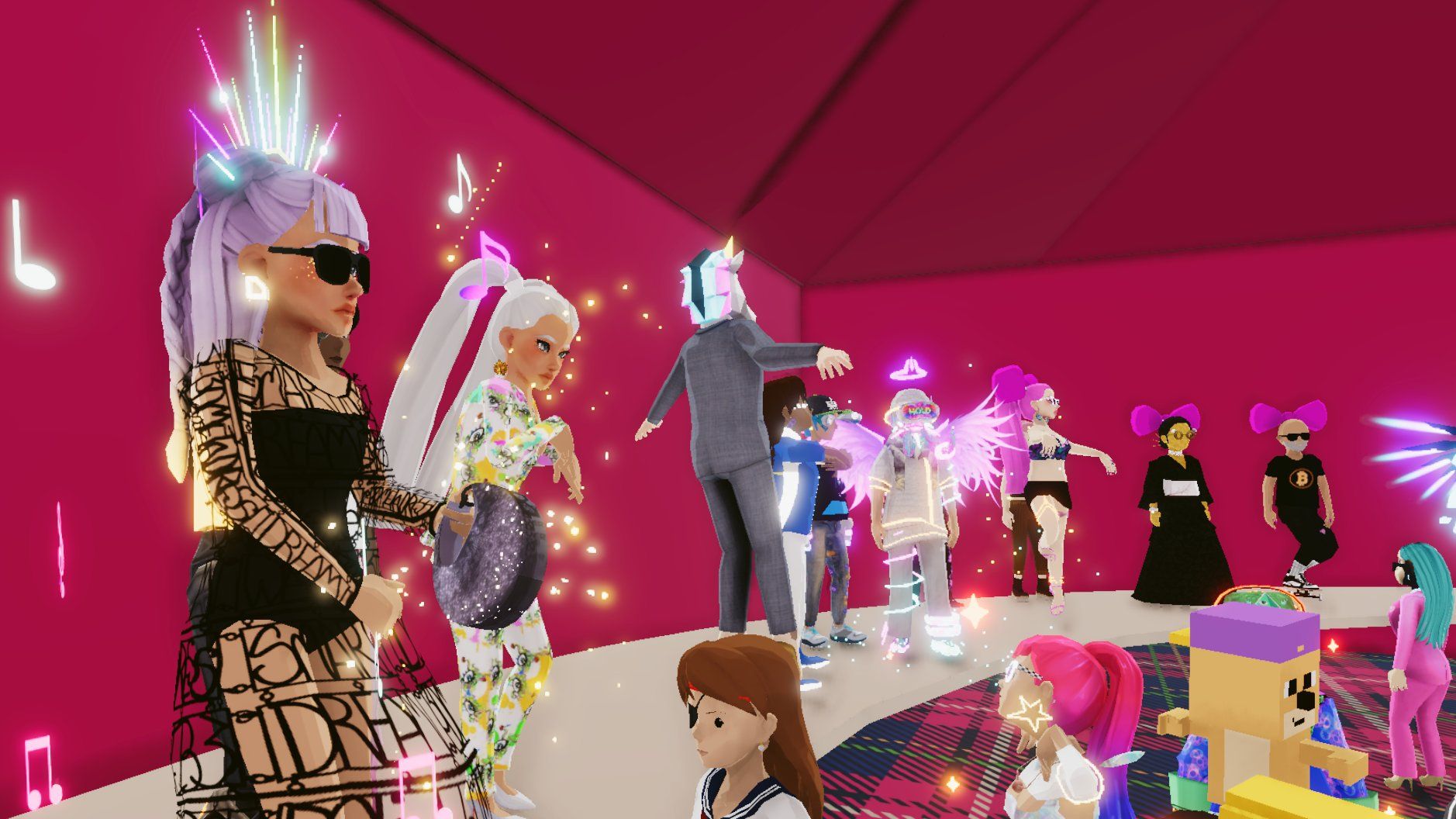
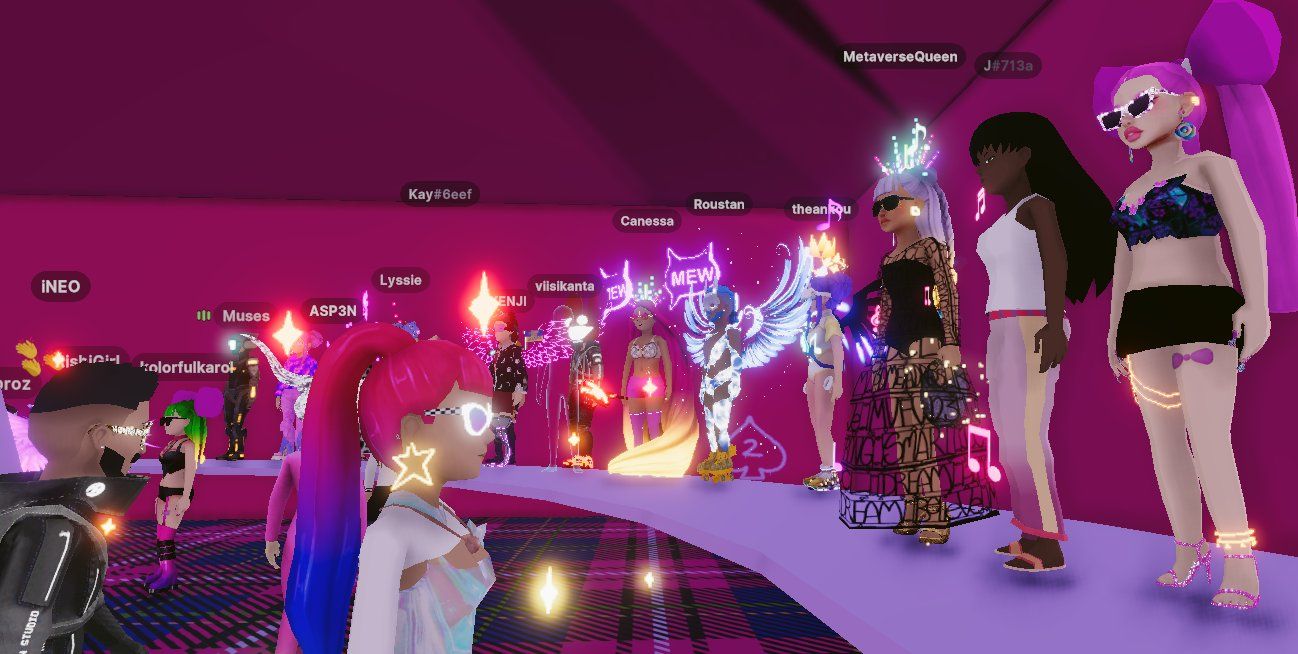
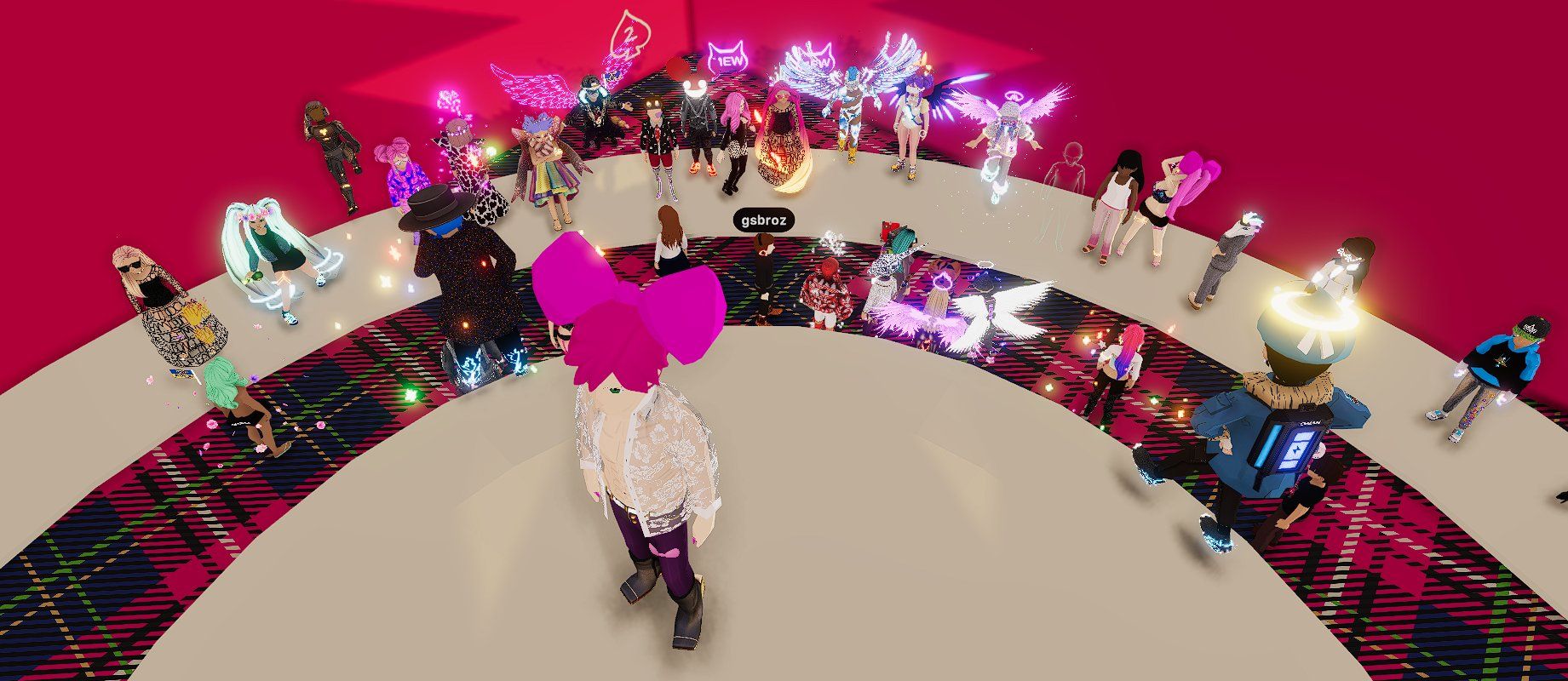

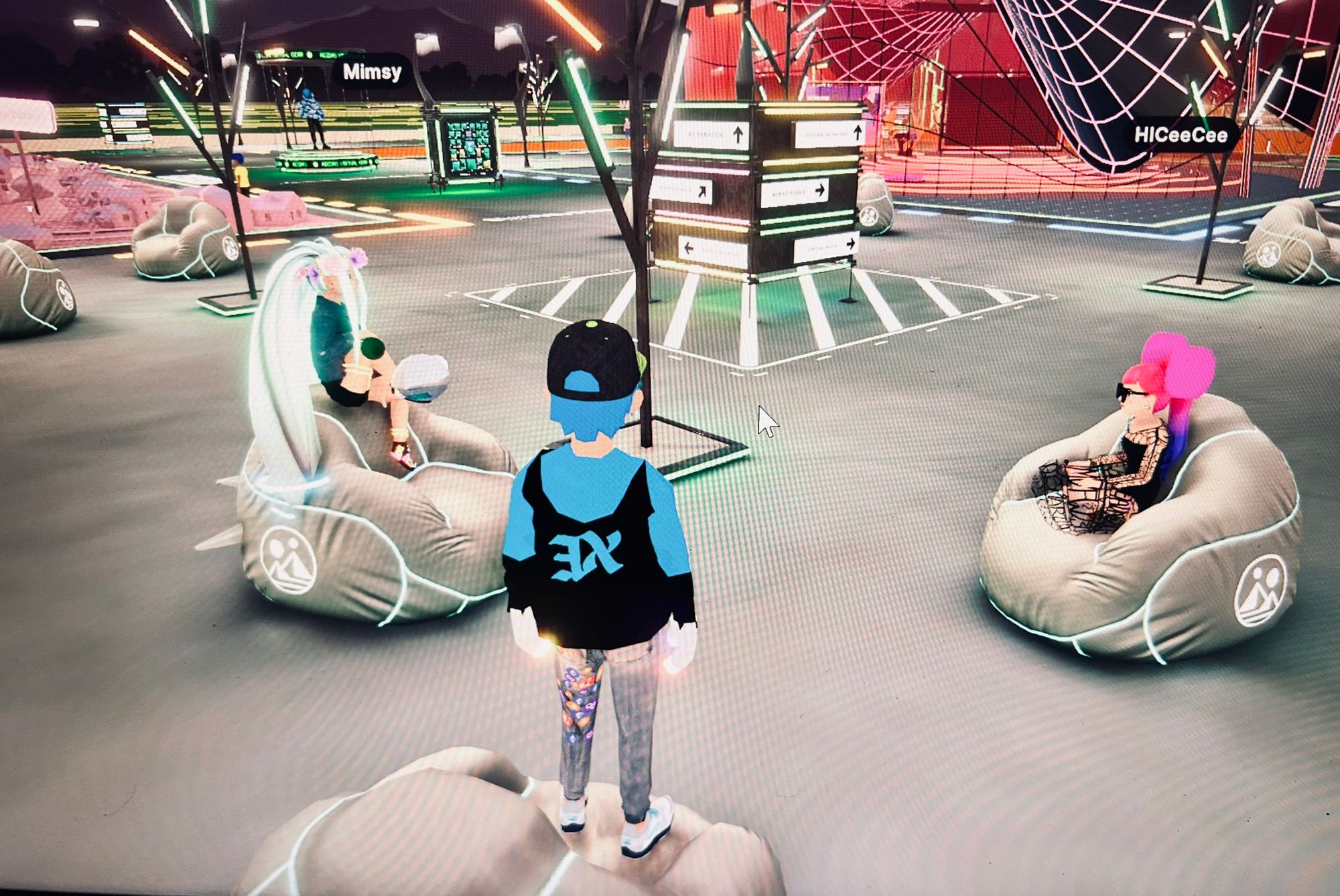
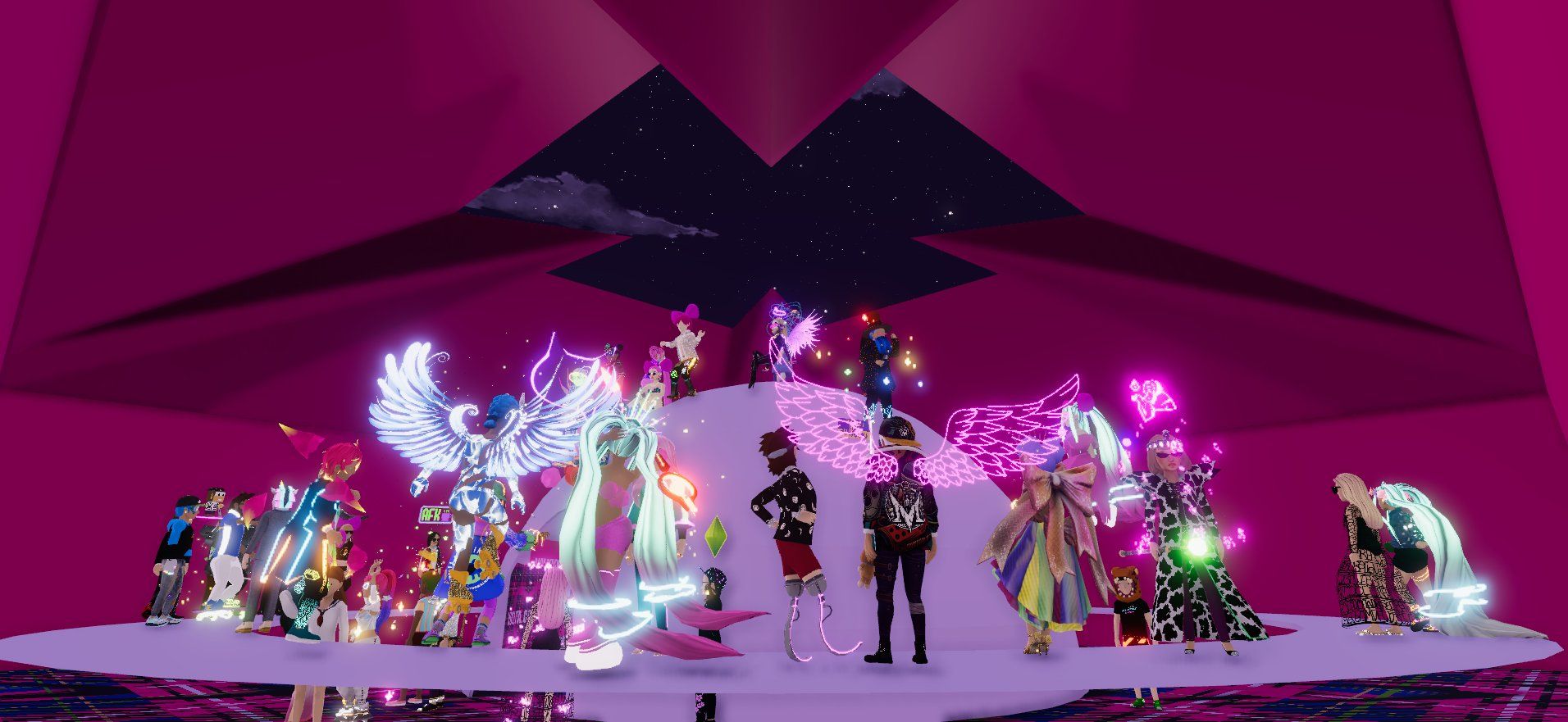
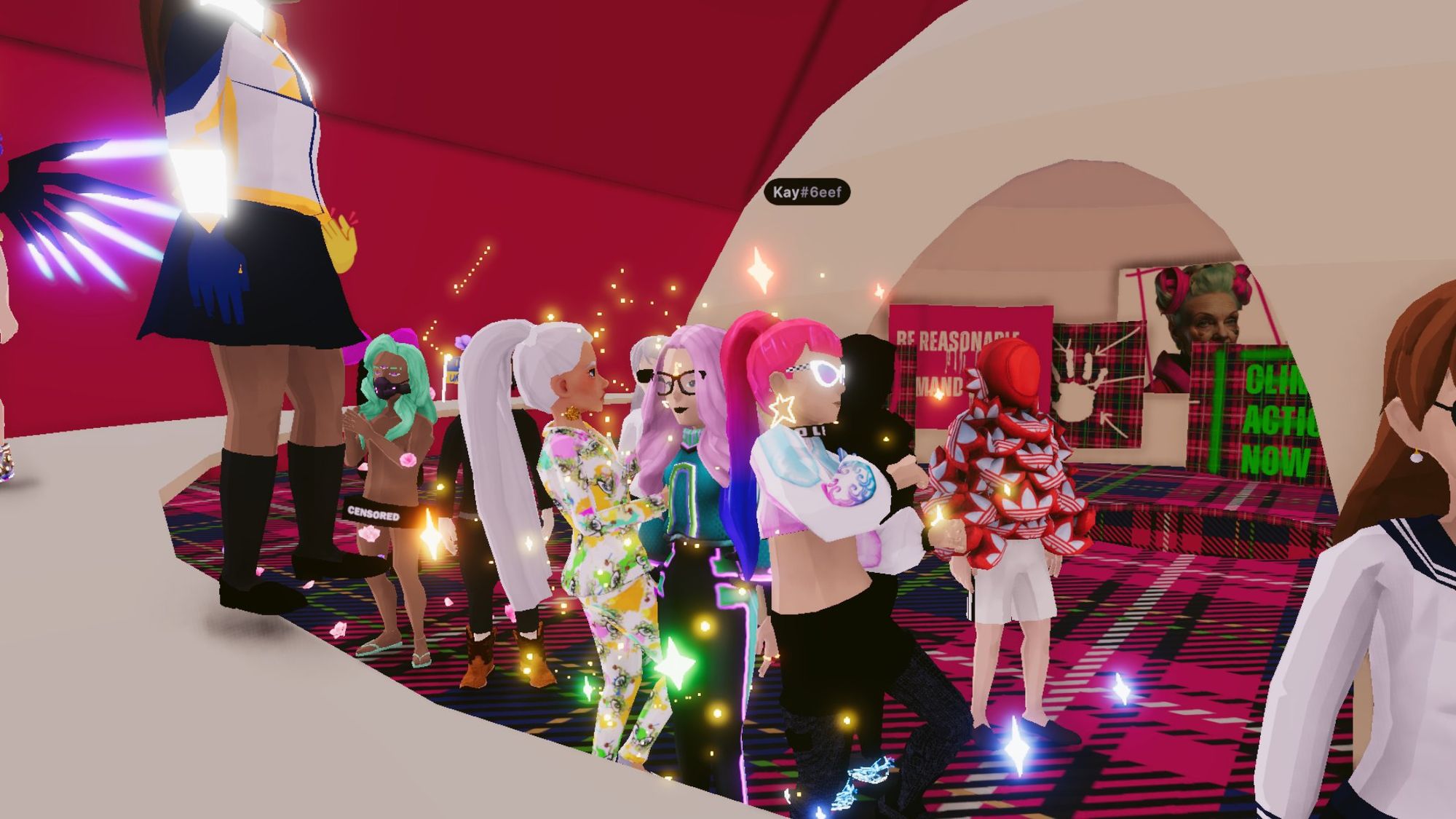
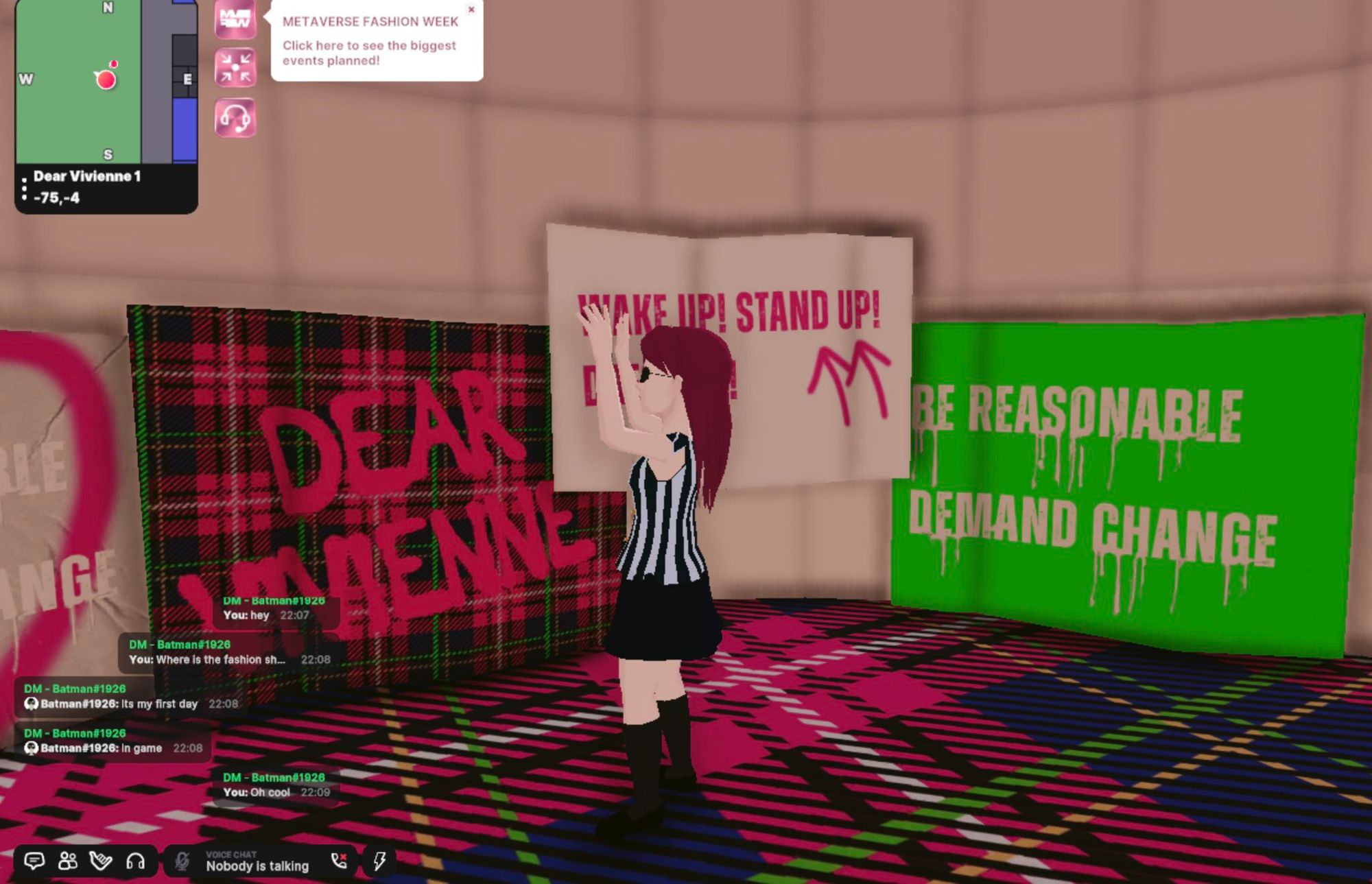
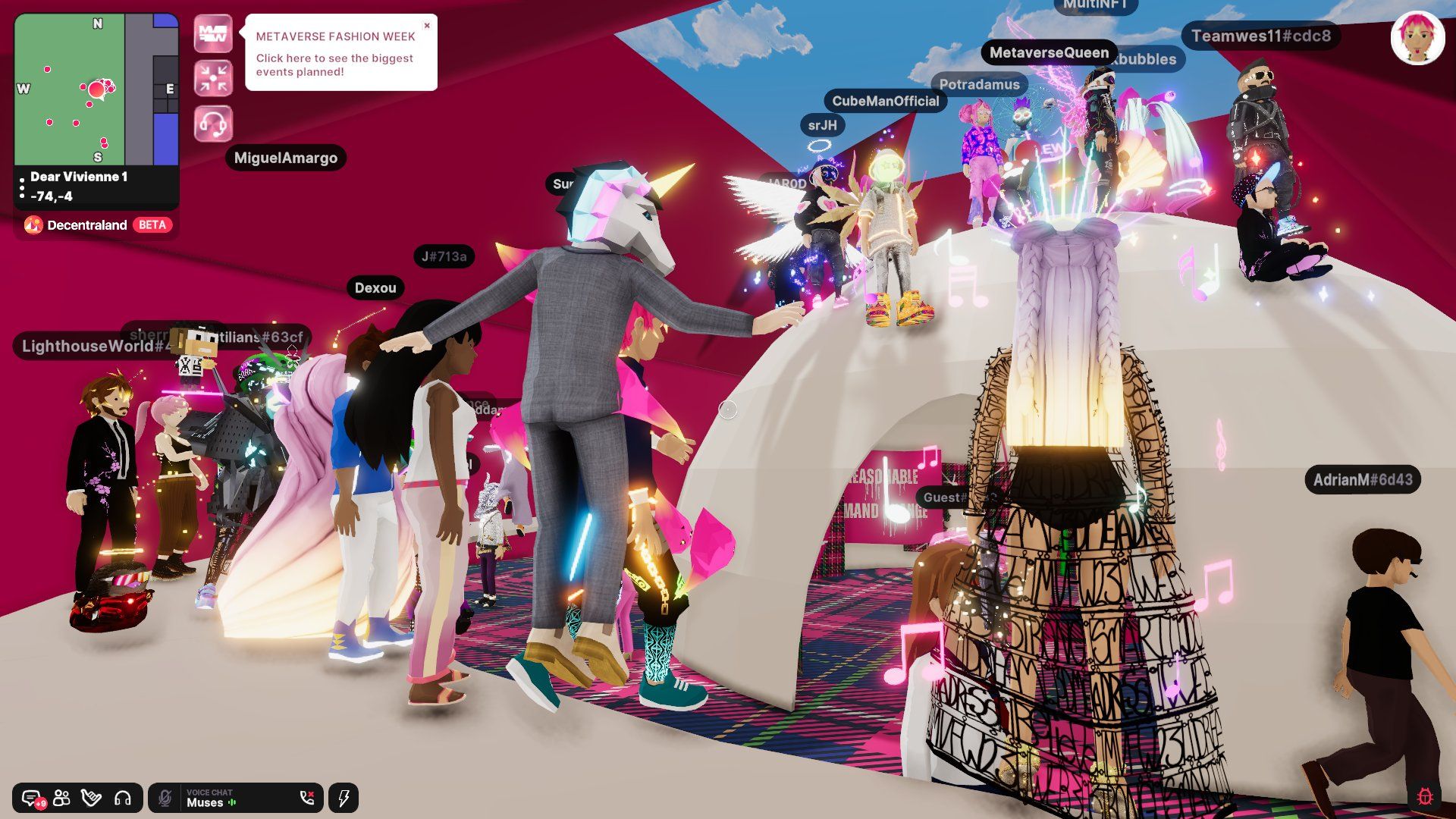
And that's where it gets interesting: a man wearing a finely tailored gray suit and pastel unicorn head, a woman displaying a white-winged angel suit, a naked person with flowing green hair, flip flops and a censored sign acting as loin cloth, a creature that looked like a Roblox-inspired mashup of marshmallow and teddy bear.
I'm using genders here fairly lightly. Clearly no one knows how anyone actually identifies IRL. Nor does it matter. You get a do-over on identity in the Metaverse.
But what struck me was how much more interesting this crowd looked than your typical VIP line at a night club. These were the 90s club kids brought back to life.
Westwood, who disrupted fashion in the early 80s (and for the next three decades) by helping punk and new wave push into high fashion, would have been proud.
Adidas Steps Up
The day prior, Adidas put on the kind of show that you really can't do on the actual planet Earth with models flying across the environment and fiery swirling vortex machines.
Both the Adidas and Westwood events are refreshing glimpses into what the future of virtual worlds might hold, where people can congregate for creative fun that doesn't revolve around mass violence or death and destruction, the primary function of most video games today.
I hope other brands are taking notes, because Adidas fashion show in Decentraland completely blew me away! 🔥@decentraland @adidas #MVFW23 pic.twitter.com/Cf7m8cdnAi
— Shiny (@ShinyDCL) March 29, 2023







